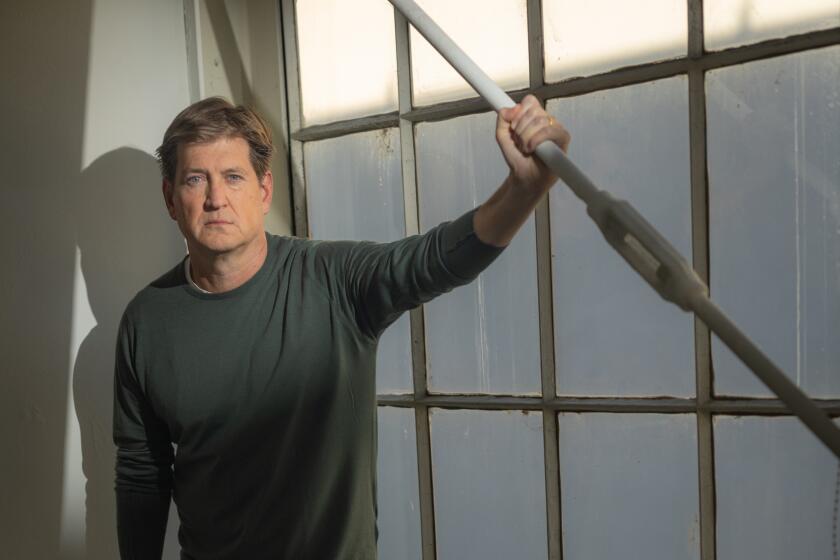Hard sell, hard lives
FOR AMC’s “Mad Men,” the network’s wry summer drama about life, love and identity in a midcentury-era Madison Avenue advertising agency, the actors appear smooth-shaven and dress in skinny neckties and cordovan shoes. Their characters drink early and often.
The actresses, trussed in tight dresses, wear pointy “bullet bras” and painful screw-on earrings. Their characters care less about careers than making a good catch and moving to Connecticut.
Cigarette smoke is as much a part of their lives as manipulating their clients and one another. Looking back now almost half a century to 1960, the year the show begins, these people seem to be from another planet.
Creator Matthew Weiner has had subtle fun with the alien dialogue: When the sexy secretary explains to the new girl how men made her electric typewriter so easy a woman can use it, the young girl replies in all earnestness, “I hope so.” But the tone of the era’s sexist, racist and anti-Semitic talk can also be neutral, or dark. When the office’s star ad man Don Draper -- played by Jon Hamm (“We Were Soldiers”), coifed and suited to classic leading-man perfection, gets irritated in a meeting, he walks out, saying “I’m not going to let a woman talk to me like this.” When asked if the company has ever hired a Jew, he says, “Not on my watch.”
Like science fiction, period dramas often reflect current concerns and “Mad Men” aims to explore the complications of our office-based lives, which Weiner believes have similarities to those at the end of the ‘50s. The 13-episode series will premiere at 10 p.m. Thursday.
According to Weiner (a former “Sopranos” writer), such characters were real then, and despite our pretensions to political correctness, they still exist today. Writing the dialogue in “Mad Men” is a “pleasure,” he said, “not only in an attempt to capture that time but also to let people express those ideas and not pretend they don’t happen.”
Susan Jeffords, a professor of English at the University of Washington, called 1960 “a watershed year for thinking about a massive cultural change on the horizon.” Many children of the ‘60s, among them Hollywood producers and writers, perceive the world is challenging that era’s values in a similar way. “There is a perception that we are in a radically formative moment for American culture,” she said.
Lately, people have focused on how work has become the frame through which they see their lives, she said. The office has become the one place where social lives, gender relationships, power struggles and sexuality all play out.
“Mad (for Madison Avenue) Men” is AMC’s first original drama series, after its 2006 movie “Broken Trail” and the British import “Hustle.” The network picked up the show after others, including HBO, had passed. But Weiner said executives have given him the same sort of creative freedom he experienced at HBO and a large enough but unspecified budget to make the show he’s been writing off and on for seven years. What’s more, AMC, whose slogan is “Television for Movie People,” had the series shot on film, rather than tape, to achieve a cinematic quality.
The series follows the handsome top-dog Draper, a secretive and cynical romantic, as he struggles to stay ahead of the fast-changing times while fending off the shrewd younger execs nipping at his heels. His main competition is Pete, a backstabbing college man, recently married. Draper’s new secretary, Peggy (Elisabeth Moss), is learning what men expect from the more experienced Joan (Christina Hendricks).
The heavily promoted show has already drawn complaints. One consumer watchdog organization complained to the liquor trade association that Jack Daniel’s whiskey, a sponsor of the show, will be violating liquor industry standards by mixing alcohol with irresponsible behavior portrayed on the show and by being placed in a few scenes.
On the other hand, Randall Rothenberg, author of “Where the Suckers Moon,” a cultural history of advertising, said, “If you can’t have product placement in a show about commercial marketing and advertisement, where can you have it?”
Portraying advertising as a world of brutal cynicism has been popular for decades, Rothenberg said. “It’s part and parcel of the way advertising people like to portray themselves,” he said. “The reality is, it’s a helluva lot of fun, and they don’t want anybody else in it.”
Whose reality is it anyway?
ADVERTISING is also a way to convey images of the supposed conformity of the midcentury and postwar consumerism, but the messages have been oversimplified or contradictory, according to academics in cultural studies. Were the ad men happily pampered (1948’s “Mr. Blandings Builds His Dream House”) or deeply troubled (1960’s “The Apartment”)? In 2002, Todd Haynes’ “Far From Heaven” presented a more complex take on the period with themes of repressed homosexuality and interracial attraction.
Next year’s dark “Revolutionary Road,” based on the novel by Richard Yates and directed by Sam Mendes, continues the trend. The film will reteam “Titanic’s” Leonardo DiCaprio and Kate Winslet as a mid-1950s couple struggling with personal issues, including abortion, in the Connecticut suburbs.
Weiner, 42, said the subject of advertising resonates because it’s a business of promotion and image. “I wanted to look at this period and see if the people were who I think they were. They did shape our lives. But they were not always who we think they were,” he said. “They do have interior lives. They’re lying a lot. They have unexpressed wishes. They behave one way and think another.”
He also wanted to explore contradictions, tensions and intergenerational power struggles played out among men in the office: Roger Sterling (played by John Slattery) in his 50s, Don Draper in his 30s and Pete (Vincent Kartheiser) in his 20s. “People in their 20s have a different set of rules. That generation had gone to college, they were the Elvis generation and were seen as pampered and cruder. There’s an immediate conflict. Once you get older, no matter what else that young person has, they have youth. You can make fun of it, but they will always have that on you.”
Weiner said his characters’ actions will have consequences. “I’m striving for reality,” he said. “One of the edicts is: all ashtrays have to be full. When people smoke, they have to cough. When people drink, they have to be drunk. Not that there weren’t some people drinking all day who never showed it.”
In the end, he said, “I’m not doing a history lesson. I’m doing something about people.”
--
More to Read
The complete guide to home viewing
Get Screen Gab for everything about the TV shows and streaming movies everyone’s talking about.
You may occasionally receive promotional content from the Los Angeles Times.






